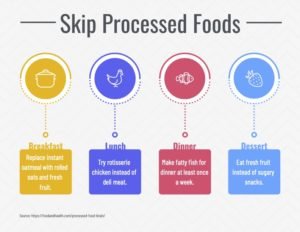Processed Food May Decrease Processing in Your Brain
With lingering Halloween candy and the high probability of desserts with the upcoming holidays, our aging brains could take a hit.A recent study on aging rats found a link to a diet high in processed food and signs of memory loss after just four weeks. The upside? Adding omega-3-fatty acid supplements helped prevent memory problems and decreased inflammatory effects in older rats.The changes in cognition were not observed in young adult rats consuming a processed diet, but it’s never too soon to start limiting these foods.The foods used in the study mimicked convenient human foods that are highly-processed for long shelf life such as potato chips and various snacks, frozen dinners, pasta, pizza and deli meats that contain preservatives.These types of highly-processed foods are also linked with obesity and type 2 diabetes, which means older adults may want to cut their intake of them and add more foods high in omega-3-fatty acids (including salmon or flaxseeds) to their diets. Remember, negative effects of processed foods were seen in as little as four weeks.The senior study author Ruth Barrientos, an investigator at the Ohio State University Institute for Behavioral Medicine and Research noted, “The fact we're seeing these effects so quickly is a little bit alarming." She notes that the findings suggest that intake of processed food can negatively impact an aging brain in very little time. These changes can quickly increase the likelihood of neurodegenerative diseases like Alzheimer’s disease. Reducing processed foods and adding more foods rich in omega-3-fatty acids may help prevent or slow the process.Dr. Barriento’s research looks at how everyday events in life like surgery, an infection or an unhealthy diet may trigger inflammation in the aging brain. Her specific focus is on the hippocampus and amygdala areas. Her work adds to previous research that a high-fat diet in the short term can progress to memory loss and brain inflammation in older animals and that DHA levels are reduced in the hippocampus and amygdala in the brains of aging rats.Docosahexaenoic acid (AKA DHA) is an omega-3-fatty acid found with eicosapentaenoic acid (EPA) in fish and other seafood. Some of the functions of DHA in the brain include a role in fighting the inflammatory response. This study is the first in evaluating its ability to fight brain inflammation initiated by processed food.Researchers randomly assigned 3-month and 24-month old male rats to normal chow (32% protein, 54% complex carbs and 14% fat), a highly-processed diet (nearly 20% protein, 63% refined carbs and 17% fat) or the same processed diet with the addition of DHA.Older rats that consumed the processed diet alone compared to younger rats on any diet and older rats that ate a diet with DHA-supplemented processed food experienced activation of genes linked to pro-inflammatory proteins and other inflammation markers in the hippocampus and amygdala. In addition, older rats on the processed food diet showed signs of memory loss during behavioral tests that were not apparent in the young rats.Abnormalities in the amygdala were observed based on the lack of display of anticipatory fear behaviors in response to a danger cue. In humans, the amygdala is often implicated with emotional memories including fear and anxiety-producing events. If this part of the brain is damaged, normal cues that inform the brain of danger could be overlooked or result in poor decision making.Results showed that DHA-supplemented processed-food diets in the older rats prevented increased inflammatory responses in the brain as well as behavioral cues of memory loss. It’s unclear the precise dose of DHA, nutrients, or calories consumed by the animals, which had unlimited access to food. A significant weight gain was observed in both older and younger rats. DHA supplementation did not protect against weight gain associated with the highly processed food diet.Barrientos discourages people from thinking that this gives a green light on highly-processed food as long as DHA supplements are taken. Focusing on a healthy diet overall is a better bet. These types of foods may be marketed as low in fat, but tend to be highly-processed with refined carbohydrates and minimal dietary fiber. Consumers should focus on the quality of carbohydrates and fiber when reviewing nutrition information.How can healthcare providers discourage highly-processed food? Below are some tips:
- Swap processed instant cereals with regular oats, cinnamon, chopped nuts, and a drizzle of honey or maple syrup.
- Snack on fruit or whole grain crackers with nut butter in place of processed crackers and peanut butter.
- Replace snack chips with lightly salted nuts or seeds.
- Enjoy dates, raisins, or dried apricots in place of sugary desserts.
- Add chia seeds or ground flaxseeds to oatmeal, yogurt, or salads to boost omega-3-fatty acid intake.
- Choose fatty fish twice per week (when able) including salmon, mackerel, and albacore tuna.
- Reduce fast food consumption when possible. Prepare a few meals per week that include beans and lentils.
- Purchase a rotisserie chicken in place of deli meat. This may be used for sandwiches, soups, or salads.
- Limit intake of processed sausages, hot dogs, and other cured meats.
- Add chopped veggies to eggs, sandwiches, soups, and grain dishes to boost fiber, vitamin, and mineral intake.
By Lisa Andrews, MEd, RD, LDJournal Reference:Michael J. Butler, Nicholas P. Deems, Stephanie Muscat, Christopher M. Butt, Martha A. Belury, Ruth M. Barrientos. Dietary DHA prevents cognitive impairment and inflammatory gene expression in aged male rats fed a diet enriched with refined carbohydrates. Brain, Behavior, and Immunity, 2021; 98: 198 DOI: 10.1016/j.bbi.2021.08.214Printable Handout: